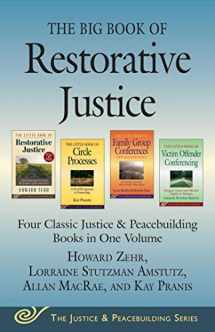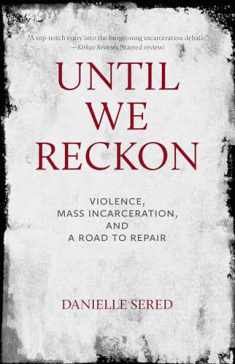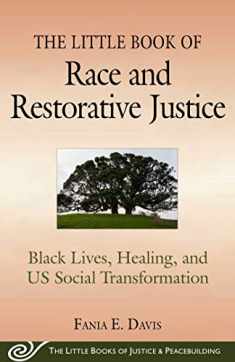
The Big Book of Restorative Justice: Four Classic Justice & Peacebuilding Books in One Volume (Justice and Peacebuilding)
ISBN-13:
9781680990560
ISBN-10:
168099056X
Author:
Lorraine Stutzman Amstutz, Kay Pranis, Howard Zehr, Allan MacRae
Publication date:
2015
Publisher:
Good Books
Format:
Paperback
368 pages
FREE US shipping
on ALL non-marketplace orders
Marketplace
from $13.71
USD
Marketplace offers
Seller
Condition
Note
Seller
Condition
New
Brand New! Not overstocks! Brand New direct from the publisher! Ships in sturdy cardboard packaging.
Book details
ISBN-13:
9781680990560
ISBN-10:
168099056X
Author:
Lorraine Stutzman Amstutz, Kay Pranis, Howard Zehr, Allan MacRae
Publication date:
2015
Publisher:
Good Books
Format:
Paperback
368 pages
Summary
The Big Book of Restorative Justice: Four Classic Justice & Peacebuilding Books in One Volume (Justice and Peacebuilding) (ISBN-13: 9781680990560 and ISBN-10: 168099056X), written by authors
Lorraine Stutzman Amstutz, Kay Pranis, Howard Zehr, Allan MacRae, was published by Good Books in 2015.
With an overall rating of 3.5 stars, it's a notable title among other
Christian Living
(Conflict Resolution & Mediation, Human Resources, Criminal Procedure, Rules & Procedures, Alternative Dispute Resolution, Arbitration, Negotiation & Mediation, Criminology, Social Sciences, Christian Books & Bibles) books. You can easily purchase or rent The Big Book of Restorative Justice: Four Classic Justice & Peacebuilding Books in One Volume (Justice and Peacebuilding) (Paperback, Used) from BooksRun,
along with many other new and used
Christian Living
books
and textbooks.
And, if you're looking to sell your copy, our current buyback offer is $0.55.
Description
For the first time, the four most popular restorative justice books in the Justice & Peacebuilding series—The Little Book of Restorative Justice: Revised and Updated, The Little Book of Victim Offender Conferencing, The Little Book of Family Group Conferences, and The Little Book of Circle Processes—are available in one affordable volume.
Restorative justice, with its emphasis on identifying the justice needs of everyone involved in a crime, is a worldwide movement of growing influence that is helping victims and communities heal while holding criminals accountable for their actions. This is not a soft-on-crime, feel-good philosophy, but rather a concrete effort to bring justice and healing to everyone involved in a crime. Circle processes draw from the Native American tradition of gathering in a circle to solve problems as a community. Peacemaking circles are used in neighborhoods, in schools, in the workplace, and in social services to support victims of all kinds, resolve behavior problems, and create positive climates.
Each book is written by a scholar at the forefront of these movements, making this important reading for classrooms, community leaders, and anyone involved with conflict resolution.
Restorative justice, with its emphasis on identifying the justice needs of everyone involved in a crime, is a worldwide movement of growing influence that is helping victims and communities heal while holding criminals accountable for their actions. This is not a soft-on-crime, feel-good philosophy, but rather a concrete effort to bring justice and healing to everyone involved in a crime. Circle processes draw from the Native American tradition of gathering in a circle to solve problems as a community. Peacemaking circles are used in neighborhoods, in schools, in the workplace, and in social services to support victims of all kinds, resolve behavior problems, and create positive climates.
Each book is written by a scholar at the forefront of these movements, making this important reading for classrooms, community leaders, and anyone involved with conflict resolution.


We would LOVE it if you could help us and other readers by reviewing the book
Book review

Congratulations! We have received your book review.
{user}
{createdAt}
by {truncated_author}




